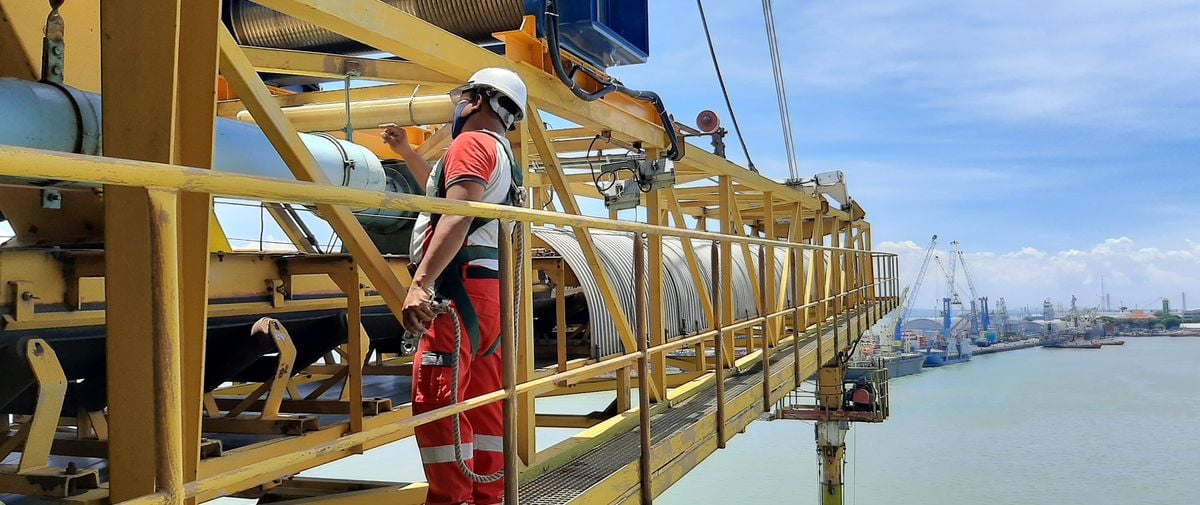The cheese in your fridge, the computer on your desk, the shirt on your back, the car in your drive, the snack in your bag – these are just a few examples of the many everyday items that we use, want, need and enjoy as part of our daily lives. But did you know the journey these products and their components have been on?
Our everyday lives would look very different without the huge machinery and smart technology that are behind the movements of raw materials and products all over the world. Almost everything you can think of, some 95% of all manufactured goods, has at some point been moved in bulk in large containers.
“I think people would be very surprised to know how many times materials are handled during their journeys from the mines, or the fields or factories – how many lifts and movements are needed to get everyday things into your homes to use or eat,” says Jukka-Pekka Reijomaa from Konecranes, a global material-handling and lifting company.
“Konecranes is an enabler for the lives that we live, we are part of the chain that makes it all possible.”
Importantly, the priority at Konecranes is to facilitate this global movement of goods, which we all now depend on, in the most sustainable way possible, by innovating and choosing materials, designs and processes that help cut emissions and bring efficiencies.
At Konecranes this means, for example, using recycled steel, electrifying formerly diesel-reliant equipment, and using smart technology to achieve operational efficiencies as well as pinpointing maintenance needs.
Smart operations: moving in bulk efficiently and sustainably
Konecranes customers such as PT Indofood Sukses Makmur are part of that chain. The company’s APAC business alone unloads a massive 10,000 tons of wheat each day, which equates to roughly approximately 6 million kilograms of flour – enough to make 12 million loaves of bread.
Moving products in such bulk on a daily basis is no small feat and magnifies the importance of efficiency.
Muhammad Yanuar Rizqi Fadhilah, Line Maintenance Supervisor of Jetty Operation and Wheat Storage in PT Indofood Sukses Makmur div. Bogasari Tb, says: “Facilities that prioritize efficiency, sustainability and quality are a must. For us, this is where Konecranes is here to help complete the puzzle of material handling needs.”
PT Indofood Sukses Makmur’s three Jeti ship loaders, which are used to transport food raw materials from the ship to the customer’s site, have been in heavy use since they were built in the 1980’s. Konecranes services have ensured they have not only been well maintained but also expertly future-proofed by identifying how they can be modified to be more efficient. Soon-to-be obsolete parts were also recommended by Konecranes to be replaced to make sure future maintenance wouldn’t be hindered by a lack of readily available spare parts.
Mr Fadhilah explains how this kind of support is important: “We are a growing company and have to balance market growth with increasing our capacity. On the other hand, we must try to reduce the number of breakdowns with good maintenance strategies and activities, so that we can control maintenance costs. These two things are one of the keys to the company's success - increasing our capacity and being supported by smart technology and maintenance.”
To achieve this, Indofood accepted Konecranes’ retrofitting recommendations for their Jeti ship loaders. With upgraded booms, the loading and unloading speeds have been increased by 25% - and the equipment can continue to function and deliver in accordance of the business’s needs safely and effectively for many more years to come.
Smart maintenance and modernization: win-win for business and environment
Extending the lifespan of existing equipment in a smart way is indeed a no-brainer for businesses seeking to operate more sustainably, while also achieving efficiencies and boosting their bottom line.
Reijomaa explains: "Modernizations, or retrofitting, is when we have an existing crane which needs modifications typically to adjust to increased production demands, to changed legislation, or because some components have become obsolete.
“We can add new features and benefits, with sustainability in mind – which save energy with elements such as regenerative units that re-use power generated from braking. They are also more ergonomic to use, creating a less stressful environment to control the crane. We can also introduce automation for more efficient operations.”
The global everyday, delivered more sustainably
Striving for sustainability has become requirement consumers increasingly demand from businesses that they engage with. Meanwhile globalization is also here to stay, and is a key feature in the way people all over the world live their lives and the products they choose to consume.
Reijomaa concludes: “Bringing the complex global movement of goods and sustainability together is a must – something businesses such as Konecranes know and are proud to be at the forefront of delivering.
“Smart operations, and maintenance, not only help us and our clients achieve sustainability goals, but also to run businesses more efficiently. It’s a win-win.”
